

The four-part story is referred to as a "cycle," designating "series." But the meaning "something that comes full circle" applies as well. [See "Further Reading."]
The titles, with English translation, are as follows:
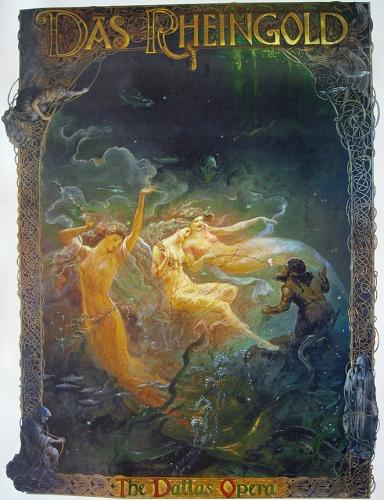 |
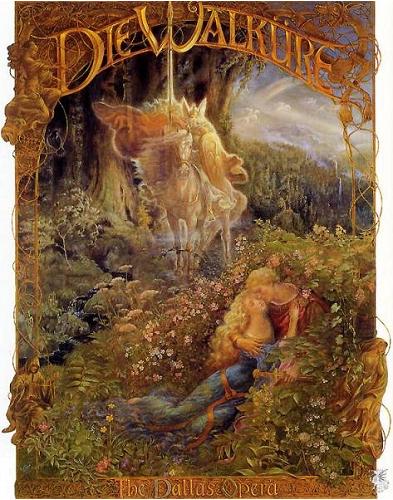 |
|
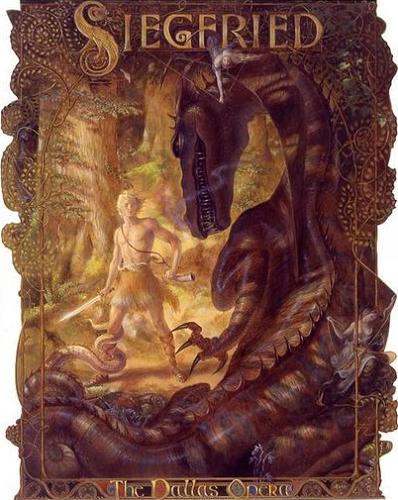 |
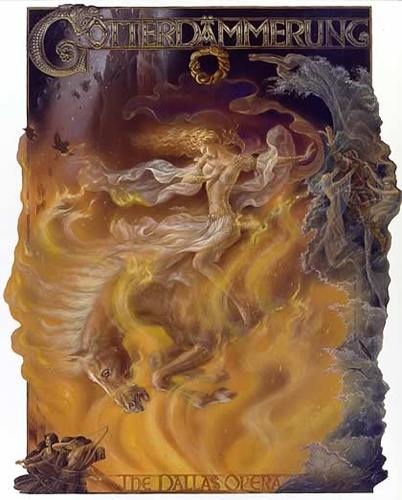 |
The Dallas Opera has presented "The Ring" in a one-opera-a-year format rather than the original one-a-day. That creates a nice suspenseful anticipation, but not one as extreme as the Star Wars fans put up with. In the posters for the operas, notice the female figures around the edges trying to fashion unorganized strands into a meaningful design. These apparently represent the Norns, who weave the threads of fate.

Here's the gist of the story,
simplified and in my own words.
(Rated PG-13; Parents please read first!)
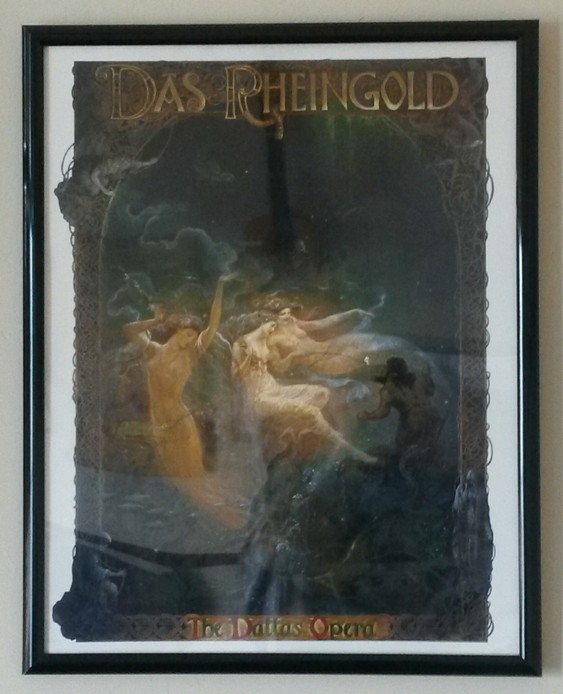
The dwarf, Alberich, explained that he had tried to take his life because he was so unattractive that no woman would ever want him. The Rhinemaidens decided to have a little fun at his expense, flirting with him and telling him that they found him handsome. When he realized they were making sport of him, he got his revenge by distracting them and taking their gold.
Meanwhile, Wotan, a V.I.P. among the immortals, was building a magnificent palace named Valhalla. Of course, he was not doing the labor himself; he had hired a giant named Fasolt and his brother Fafner.
What Wotan had promised the giants as payment was Freia, the sister of his wife Fricka. This didn't please either of the goddesses too much, but Wotan told them, "Relax! Freia won't ever have to go with them. When the time comes, I'll find something else to appease them."
Then Wotan found out about the dwarf Alberich, who was somehow amassing a great fortune. He took Loge, the fire god, with him to visit this unlikely millionaire in his underground lair. Alberich showed them a large stack of golden cinderblocks, telling them that he had accomplished this through the power of his magic ring.
He further demonstrated his power by turning himself into a huge dinosaur. "Very impressive, yes," said Loge, "but can you turn yourself into something small, like say, a toad?"
When the dwarf did so, Wotan and Loge captured him, whereupon they stole his stack of gold and the ring whose power had afforded him said stack. (I said they were "gods"; I didn't say they were good!)
When the giants finished building and came to collect payment, Wotan said, "Well, turns out that Freia is no longer available, but I have some big gold blocks that should do nicely." "I can't stand the thought of living without this beautiful girl," answered Fasolt, "but if you would stack some of those blocks in front of her until I can no longer see her, that will be enough payment."
So Wotan's servants began piling the gold up to hide Freia from the giant. When they thought the task was finished, there was only one block left. "I can still see a little bit of the top of her head," complained Fasolt. So the last block was added to the pile. "There's one little problem, said Fasolt. "There's a tiny chink of light in the middle. But I think that ring on your finger will fit it perfectly."
Wotan knew that he had been had! He yielded the ring along with all the gold, then slinked off into the palace with his wife and sister-in-law.
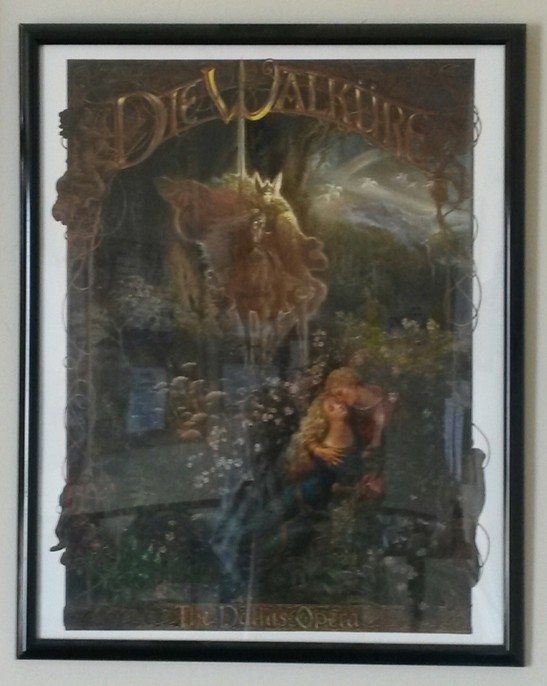
One of the Valkyries, Brünnhilde, was a romantic at heart. In her travels, she came across a handsome young man named Siegmund. But he was not for her, because his love interest was a beautiful girl named Sieglinde. "Now they make a cute couple," she thought.
Sieglinde had been married to a bad guy named Hunding. It was a marriage she was forced into; she never loved the villain. She chanced to meet Siegmund, and the romantic attraction was immediate and mutual. Unfortunately, upon comparing notes, they realized that they were twins separated at birth.
That wasn't the strangest part. Their birthfather was Wotan, and they were the results of his cheating on his wife Fricka. So not only were Siegmund and Sieglinde half-immortal, they were half-siblings of Brünnhilde!
Hunding challenged Siegmund to a duel with swords. Wotan naturally sided with his [illegitimate] son. Fricka, of course, believed Siegmund should be punished for Wotan's unfaithfulness as well as for his own immoral relationship with his twin sister. Wotan reluctantly agreed with Fricka, who was after all the goddess of marriage.
So Brünnhilde was given the assignment of ensuring a win for Hunding. However, she disobeyed and helped Siegmund instead. Before the fight was over, Wotan stepped in, and Hunding killed Siegmund. Wotan then struck Hunding dead as well.
Brünnhilde's punishment for defying her parents included becoming a mere mortal. She was then to be placed in a deep sleep on a bare rock to face whatever fate brought about. She begged for mercy, and the compromise was that the rock would be surrounded by impenetrable fire to protect her from human predators. She was not on course to live happily ever after!
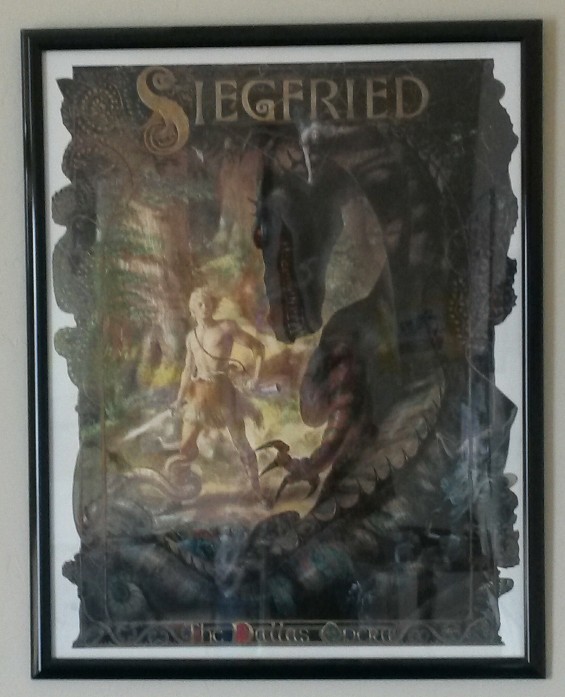
Siegfried's parents had been involved—unwittingly, at first—in an illicit relationship. Their names were Siegmund and Sieglinde.
Brave Siegfried went in search of a ferocious dinosaur who had been attacking innocent travelers through a certain forest. His quest was successful, as was his assault on the evil beast. Among the items he found in the dinosaur's lair, Siegfried discovered a very special ring. It was one with an unusual history.
That ring had at one time belonged to a giant named Fasolt. Or perhaps to his brother Fafner. Or to both. The ring was worth killing over, because of the great power wielded by its owner. And so it was that the evil Fafner, unwilling to give up the ring or even to share it, killed Fasolt.
He had then turned himself into a ferocious dinosaur. . . .
Siegfried's next—and in my opinion greatest—adventure was to rescue a Valkyrie from imprisonment on a bare rock surrounded by magic fire. Possession of the ring gave him something no other mortal had: the power to penetrate Wotan's flames.
Naturally, Brünnhilde fell in love with her hero. Having already lost her immortality, she sacrificed nothing to marry him, and the two were on course to live happily ever after.
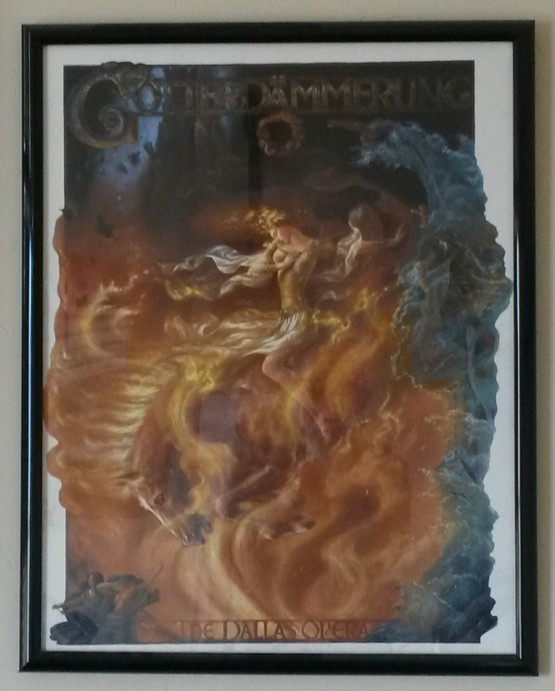
Siegfried, fiancé of Brünnhilde, would often go on outings with Hagen and Gunther. Unbeknownst to Siegfried, Hagen was the son of Alberich, the dwarf who stole the Rhine Gold and made it into the powerful ring which was now in Siegfriend's possession. Hagen was determined to gain it back on behalf of his father.
Hagen's canteen was filled with a magic potion, perhaps left over from Alberich's days as a wonderworker. He offered a sip to Siegfried, who immediately forgot certain important details about his own history, most significantly, that he was in love with, and engaged to be married to, Brünnhilde.
Gunther then took advantage of the situation by confessing his love for Brünnhilde and asking Siegfried to fix them up. Brünnhilde was completely caught off guard by her lover's betrayal. So, when Hagen asked her assistance in figuring out how to kill her erstwhile hero, she said he would have to be stabbed in the back by a perceived ally, because he would never turn his back on a known enemy.
On their next outing, Siegfried took another sip from Hagen's canteen. As he began to regain the lost pieces of his memory, he recounted the entire story.
Seeing Siegfried turn away as he told his tale, Hagen seized the opportunity and killed him. But when he tried to remove the ring, the corpse raised its fist. Even in death, Siegfried was more than a match for this dwarf!
When Brünnhilde realized that she had indeed been betrayed, but not by her true love, she arranged for him to receive a hero's funeral on the shore of the Rhine. This meant that his body would be burned on a funeral pyre.
Another attempt by Hagen to remove Siegfried's ring failed when the fire was lit. As the flames rose higher, so did the river, flooding its banks. Embers flew into the air, catching Erda's tree on fire. At the last instant, Brünnhilde rode her horse onto the pyre, joining her hero in death.
The Rhinemaidens rose from the waters and dragged Hagen to his death beneath the river. They also seized the gold, carrying it back to its place of origin in the riverbed, while Valhalla crumbled to the ground.